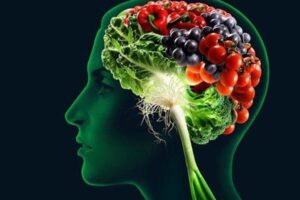7 reasons why food and mental health are so connected.
Category: Blogs
- Nutrient Intake: The brain requires a variety of nutrients to function properly. These nutrients include vitamins, minerals, amino acids, and fatty acids. A deficiency in any of these can lead to mental health issues. For example, a deficiency in B vitamins, such as folate and B12, has been linked to depression and other mood disorders.
- Gut-Brain Connection: Emerging research has shown that there is a strong connection between the gut and the brain, known as the gut-brain axis. The health of the gut microbiome, which is influenced by our diet, can have a profound impact on mental health. An imbalance in gut bacteria (dysbiosis) has been linked to conditions like anxiety and depression.
- Inflammation: Certain foods, particularly those high in sugar, refined carbohydrates, and trans fats, can promote inflammation in the body. Chronic inflammation has been associated with a higher risk of mental health disorders, including depression and anxiety. Conversely, an anti-inflammatory diet rich in fruits, vegetables, and omega-3 fatty acids can have a protective effect on mental health.
- Blood Sugar Regulation: Foods that cause rapid spikes and crashes in blood sugar levels, such as sugary snacks and processed foods, can affect mood and energy levels. These fluctuations in blood sugar can lead to irritability, mood swings, and fatigue.
- Serotonin Production: Serotonin is a neurotransmitter that plays a key role in regulating mood. It is derived from the amino acid tryptophan, which is found in certain foods like turkey, eggs, and dairy products. Diet can influence the availability of tryptophan and, consequently, serotonin levels in the brain.
- Diet and Mental Health Disorders: Research has shown that dietary patterns can influence the risk of developing mental health disorders. For example, the Mediterranean diet, which is rich in fruits, vegetables, whole grains, and healthy fats, has been associated with a lower risk of depression and cognitive decline.
- Psychological Factors: The relationship between food and mental health isn’t just about physical effects. Psychological factors, such as emotional eating, food cravings, and disordered eating patterns, can impact mental health directly. Stress and negative emotions can lead to unhealthy eating habits, which, in turn, can worsen mental health.
In summary, what we eat can have a significant impact on our mental health through various mechanisms, including nutrient supply, gut-brain interactions, inflammation, blood sugar regulation, neurotransmitter production, and more. A balanced and nutritious diet is an important part of maintaining good mental health, although it should be considered as one component of a broader approach that includes exercise, sleep, stress management, and professional mental health care when needed.
Can you think of any other reasons food and Mental Health are connected?

